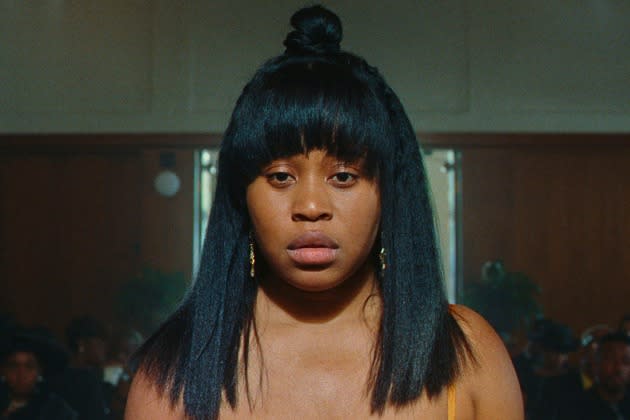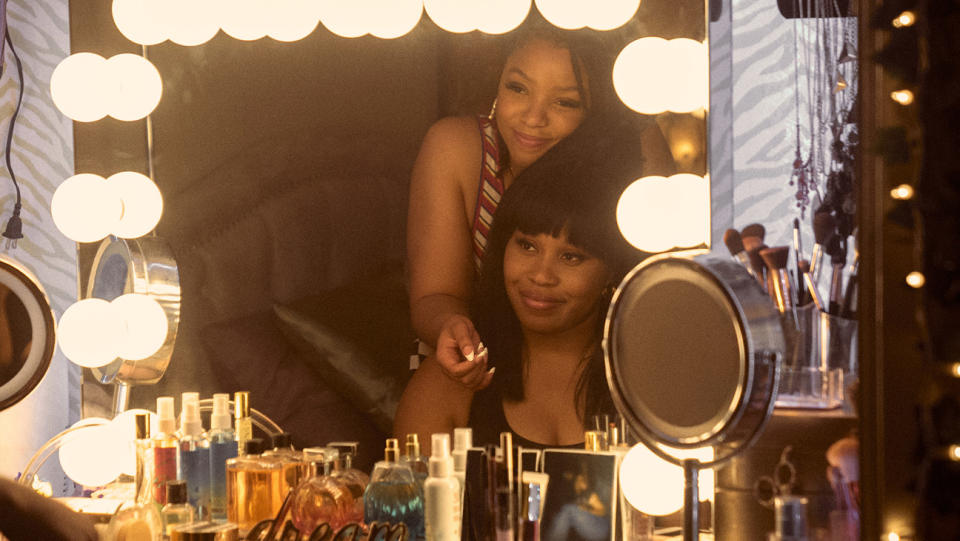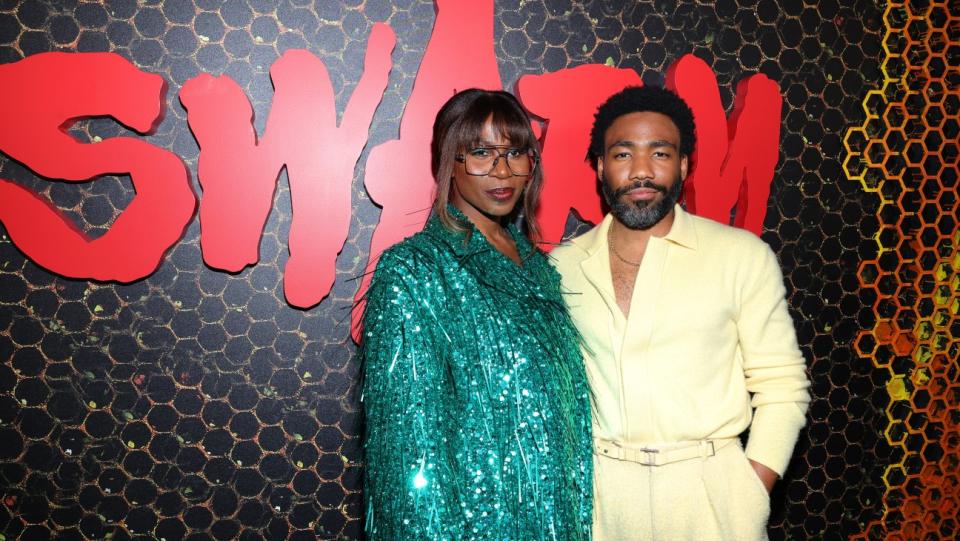‘Swarm’ Boss Janine Nabers Peels Back the Layers of True Crime-Inspired Series and Its Antihero
- Oops!Something went wrong.Please try again later.
- Oops!Something went wrong.Please try again later.
- Oops!Something went wrong.Please try again later.

[This story contains spoilers to the entire season of Swarm.]
Following this weekend’s release of Swarm, viewers on social media are still abuzz (and attempting to recover) from analyzing the performance of Dominique Fishback as Andrea “Dre” Greene, a strangely warped sweet-faced psychopath serial killer in Amazon Prime Video’s new binge watch.
More from The Hollywood Reporter
And if you ask the seven-episode series’ showrunner, who co-created the show with Donald Glover (aka rapper Childish Gambino), Janine Nabers tells The Hollywood Reporter she expected nothing less from Fishback’s portrayal of Dre, who is introduced as a mild-mannered and friendly faced young Black woman who dotes over her foster sister Marissa (Chloe Bailey) while struggling to earn income to pay the rent in their small Houston, Texas, apartment. By the end of episode one, however, the audience sees Dre rapidly spiral into a psychotic and sociopathic chaotic chasm of delusion, wrath and vengeance after blaming herself for not preventing Marissa’s act of suicide.
The sisters were unwavering with their devotion for one another, but they also shared a parasocial love for another: a mega-pop superstar named Ni’Jah. The audience sees at the beginning of episode three — during a flashback — that Dre and Marissa shared an unbreakable bond of fandom for Ni’Jah (whose story clearly mirrors that of Beyoncé’s and her swarm of fans, the Beyhive). Marissa gives a clear directive to Dre in the flashback that Ni’Jah should be as important to Dre as they are to each other. “Ni’Jah is our queen, and we must protect her at all costs,” Marissa says with love and a fanatical glare to Dre, who enthusiastically agrees.
By the third episode, the audience is a few years removed from Marissa’s death and are four murders in by the blood-stained hands and face of Dre. She still possesses that sweet demeanor at first glance, but underneath is the darkness that will see her continue to dive headfirst into a delusional world of Stan-ism over Ni’Jah. She self-ordains herself as Ni’Jah’s Number One within a group of fans affectionately known as the Swarm, and Dre will not tolerate any disrespect of her queen. Victims, unknowingly, find out in the most gruesome ways that there is no mercy once they have run afoul of Dre’s creed for Ni’Jah. Dre asks her victims a simple five-word question: “Who is your favorite artist?” The right or wrong answer is literally a matter of life or death (mostly the latter for those Dre seeks out or meets by happenstance).
Swarm, through a horror lens, tackles themes of marginalization of individuals who don’t seem to fit in; a failed government system for unwanted children in foster care; and the effects of social media. Below, Nabers chats with THR about the creation of her and Glover’s series being inspired by true-crime events, and how she and the producers took extra care of Fishback on set.
Dominique Fishback is phenomenal as Dre in this show. How did you go about casting her as the lead in the series?
Yeah, she’s pretty incredible in it! I think it’s something where you meet someone and you see them. She’s a theater nerd and a writer, too. She’s so bubbly and warm and caring. And then she attacks this character — and she’s so terrifying! The way she could turn it on and off, I have just never seen anything like that in anyone before.
When we sat out to cast this show, I remember talking to Donald [Glover] about it, and how with Atlanta, no one really knew who they were. When they started out with that show, they were completely unknowns. And so, I was like, “It would be really dope to go find someone who is totally unknown because this character is so fringe and out there.” I felt like we should go out and lead with someone no one really has seen before so that they wouldn’t have this preconceived notion of who they are. And [Donald] was like, “Yes, totally!”
And Dominque was such a big get because we were huge fans of hers. She has been in a lot of stuff; I mean she was incredible in Judas and the Black Messiah. And so, I was like, “If we’re going to get someone for the pilot, let’s ask this budding movie star.” It would cost us nothing to see if she would want to this bit role. And so, when she read it, she gravitated toward the role as Dre — and that was amazing.
So, Dominique wasn’t initially offered the lead part of Dre?
We were considering her for the role as Marissa. And she came in and was like, “Yeah, I can do it , but I actually want to do the main character.” And we were like, “Whoah.”

How did you safely navigate Dominique through such a dark and twisted role? What made you feel she could pull off the multiple complexities of a serial killer without a hitch as Dre?
We had a sensitivity coordinator. We actually had two sensitivity coordinators, because we shot in L.A. and Atlanta. And we also had an intimacy coordinator. The intimacy coordinator was for the safety of, well kind of like the safety of the sexual space people live in on the set. And sensitivity coordinators [focus] on the psychology of the action and the violence, the mental state of that. [Dominique] had her own therapist who she spoke with when she needed to. And I was on set all the time. It was just one of those things where if she needed something, we would figure it out, whether she needed space or just a moment.
One of our sensitivity coordinators was a Black woman who was just great in working with [the actors] when it came to issues regarding violence and trauma. I think that was helpful for Dominique, because she is someone who feels so much. I mean, even if it was just having someone standing besides her. This was especially true when we were filming episode five. So, it was a group effort where anyone wanted to give her space or whatever she needed at that particular time.
Let’s discuss the audacity of this series. The show is not only blunt trauma to the victims on the series, but it could be triggering to some viewers watching. Many of the scenes were gruesome, yet very satirical and funny at the same time. How were you and Donald Glover able to walk that line, where you didn’t take audience members too deep down a hellish rabbit hole?
With Swarm, we are putting Dre at the helm of her own story. We are putting her… or giving her the authority within the violent story. So, we are giving her authority within these violent acts. I look at this like, “Why do white guys get to do all of this? Why do white guys get to have all the fun, in terms of the Tony Sopranos and the Breaking Bad people?” That space of psychological breakdown in violence to get something that you absolutely need — which is what drives the series — has always been reserved toward the psychology of white American men.
And I think we were really excited just to explore, what are the triggers for vulnerable women in America? And, how can we just let her flag fly with this sort of brutal way of approaching this story? This Black woman is just destroying shit because she is on a mission. It sort of feels like our Pulp Fiction.

Are there any hidden messages in the series? The show seemed to take inspiration from the life of Beyoncé and her fans, known as the Beyhive. Are there things in each episode that viewers might miss unless they take a second look?
You know, I don’t believe in hidden messages. Honestly, we looked at stories that happened that were on the Internet, or stories that happened that were on the news and had these very violent undertones, but a Black woman was at the center of all these different stories that happened within a two and a half-year period.
So, in a lot of ways, this story is: This is America. We’re just taking a Black woman and giving her the language and the experiences that have existed and happened over this span of two and a half years. That was the fun of making the show for me. We thought that after doing all the research and putting it together, people might watch and say, “Oh! I know what that is! I remember when that happened …”
Can you expound on episode four when we see Dre travel to Tennessee and she is lured in by a cult of white women? For the first time, the audience learns a bit more about Dre’s origins as the cult’s leader — played by pop-rock singer Billie Eilish — breaks through Dre’s shell. We find out that even as a child, Dre had a propensity for violence with the “spilling the milk” therapy scene. It was a phrase Dre used with her grandmother after events that led her to cause others to bleed.
The idea of episode four, you know, there is a cult that existed in the world that was very prominent during that time. And that is the kind of true-crime element to that episode. And I think that when people think of the idea of artists or celebrities, there is this idea of thinking about the cult of Taylor Swift, or the cult of the Beatles or whatever.
What we were really interested in was just seeing someone who worships at the altar of “something,” and [exploring] this idea of, what is the cult of the mind? How can we see the parallels between people who devote their lives to brainwashing the minds of people and indoctrinating them, and then someone whose music may brainwash someone into thinking they are friends with them or is one of the family? What is that? So, that episode was just us looking at those two dynamics. And if it’s a battle of wills, who is going to win?
Our casting director is brilliant, and when she pitched [Billie Eilish] for the role of Eva, we were like, “Oh, she’s really cool! Let’s go with it!” And it worked out. She was great!

Was that the same process for casting Paris Jackson? Her lines in episode two about no one really accepting her as a Black woman were hilarious and familiar.
Absolutely! When the scripts went out to all the actors, and they all read it and we had very thoughtful conversations with all of them. And they were all so game! When you look at this show, there are a lot multi-hyphenates. I mean, people who are writers, singers and actors. I respect that. And obviously, that is who Donald is as well.
So, our show was a community of people who were gifted in a lot of different things that contribute to us making something cool, and allowing it to exist in this metaphysical space. Because when you cast someone like Paris or Billie Eilish, there is going to be this element of modernists.
What was it like working with Malia Obama in the writers room?
We had two incredible staffers, Malia and Karen Joseph Adcock. They are both in their twenties; Donald and I are older and have kids. I mean, we know what’s happening in the streets, but it was nice to have young blood in the room to talk about the Internet and stories and storytelling. We talked about what is cool and, how can we tie it with TV? We talked about what worked and what didn’t work. All of that was just a lot of fun.
Malia is very smart and so talented. She’s hungry and wants to learn more. And as Donald said on premiere night, it feels very much like a family. It was a really nice blend of personalities and tastes. And I think that is when making a show is really refreshing, when something like that happens.
***
Interview edited for length and clarity.
Swarm is now streaming on Amazon Prime Video.

